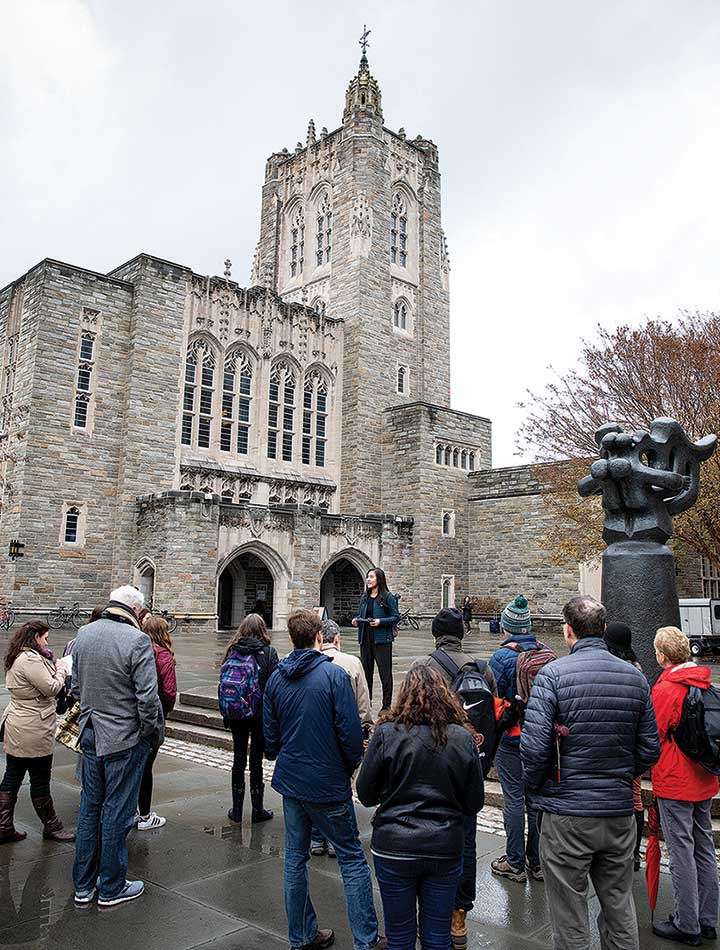Toni Morrison gave her address “The Place of the Idea; The Idea of the Place” at Princeton’s 250th anniversary celebration in 1996 on the steps of Nassau Hall. On a gray Friday in November, a tour group of 25 stood on those steps to reflect on Morrison’s description of Princeton — “It is redolent with the breath of the emotional life lived here and the intellectual life made manifest here” — and to learn about her years as a University professor.
The tour stopped at several campus locations to read the words of some of Princeton’s literary notables, including Jennifer Weiner ’91 and F. Scott Fitzgerald 1917. Outside Holder Hall, the group listened to an excerpt from a profile by John McPhee ’53 of Thomas P.F. Hoving ’53 *60, who became director of New York’s Metropolitan Museum of Art. The shenanigans of Hoving and his roommates drew laughter, along with the explanation that McPhee had roomed on the floor below them.
The tour, titled “Words and Places: A Literary Tour and Walking Workshop,” was part of Being Human, the international festival of the humanities. As the U.S. hub for the festival, the University hosted more than 20 free events from Oct. 11 through Dec. 18 on the theme of “Discoveries and Secrets.”
The goal was to make the humanities more accessible and to share Princeton’s scholarship with a wide variety of audiences. Studies in the humanities often deal with “questions about human nature that cannot be easily measurable,” said Ruby Shao ’17, project coordinator for the Humanities Council. But the beauty of the humanities, she said, is that they offer the chance to explore and connect with others.
Among the events were a guided tour of how the University experienced the Civil War, led by senior research scholar Allen C. Guelzo; “Discovering Gandhi in Prison,” lectures held inside the Garden State Youth Correctional Facility; and an open-mic performance featuring black student poets in Newark, which raised funds for clean water in the city.
Sarah Churchwell *98, a literature professor in England and the director of the festival, encouraged Princeton to join with London, Rome, Singapore, and other locations last year as a participant. Programming by the University and its partners increased this year, with activities both on campus and at other New Jersey locations.
On the campus literary tour, participants were encouraged to carry pens and notebooks in case inspiration struck. Danielle Ranucci ’23 shared a piece she wrote about Fitzgerald’s continuing Princeton presence, musing “that I likely stumble upon his spirit as it prowls around campus.”












1 Response
Norman Ravitch *62
6 Years AgoThe Humanities and Usefulness
It used to be that the humanities and related scientific and social fields were regarded as indispensable for an education. But in recent decades education has been defined by its usefulness in getting future employment with higher than normal monetary rewards. And with the rise in tuition costs, thanks to selfish university and college administrations abetted by government support for student loans, wanting an education for personal rather than monetary goals seems even less justifiable for many students and their families.
The humanities came into fashion I think mostly in the Renaissance period as the way to educate gentlemen from the elite or those lower down who had the potential to rise into the elite with the proper educational credentials. The humanities also came gradually to replace theology and religion as useful disciplines, which by now are obviously not useful. No one any more, except the very rich, can afford to spend time and finances on acquiring gentility; they need a job!